见索即付保函统一规则The Uniform Rules for Demand Guarantees
见索即付保函统一规则(URDG758)英文版
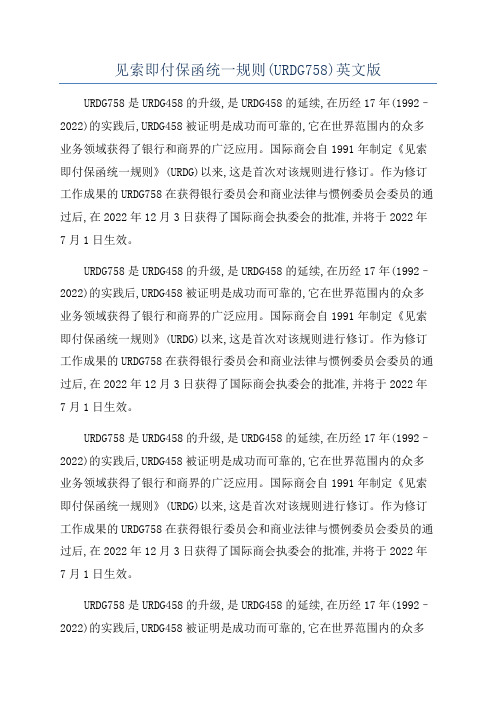
见索即付保函统一规则(URDG758)英文版URDG758是URDG458的升级,是URDG458的延续,在历经17年(1992–2022)的实践后,URDG458被证明是成功而可靠的,它在世界范围内的众多业务领域获得了银行和商界的广泛应用。
国际商会自1991年制定《见索即付保函统一规则》(URDG)以来,这是首次对该规则进行修订。
作为修订工作成果的URDG758在获得银行委员会和商业法律与惯例委员会委员的通过后,在2022年12月3日获得了国际商会执委会的批准,并将于2022年7月1日生效。
URDG758是URDG458的升级,是URDG458的延续,在历经17年(1992–2022)的实践后,URDG458被证明是成功而可靠的,它在世界范围内的众多业务领域获得了银行和商界的广泛应用。
国际商会自1991年制定《见索即付保函统一规则》(URDG)以来,这是首次对该规则进行修订。
作为修订工作成果的URDG758在获得银行委员会和商业法律与惯例委员会委员的通过后,在2022年12月3日获得了国际商会执委会的批准,并将于2022年7月1日生效。
URDG758是URDG458的升级,是URDG458的延续,在历经17年(1992–2022)的实践后,URDG458被证明是成功而可靠的,它在世界范围内的众多业务领域获得了银行和商界的广泛应用。
国际商会自1991年制定《见索即付保函统一规则》(URDG)以来,这是首次对该规则进行修订。
作为修订工作成果的URDG758在获得银行委员会和商业法律与惯例委员会委员的通过后,在2022年12月3日获得了国际商会执委会的批准,并将于2022年7月1日生效。
URDG758是URDG458的升级,是URDG458的延续,在历经17年(1992–2022)的实践后,URDG458被证明是成功而可靠的,它在世界范围内的众多业务领域获得了银行和商界的广泛应用。
国际商会自1991年制定《见索即付保函统一规则》(URDG)以来,这是首次对该规则进行修订。
见索即付保函统一规则(URDG758)

《见索即付保函统一规则》《见索即付保函统一规则2010》(The Uniform Rules for Demand Guarantees ICC Publication . 2010 Edition),国际商会第758号出版物,简称(URDG758)是国际商会在URDG458基础上,借鉴近年来保函及相关业务实践发展经验,引入全新的术语体系修订的,2009年12月3日公布,于2010年7月1日正式实施。
第1条URDG的适用范围a.见索即付保函统一规则(简称“URDG”)适用于任何明确表明适用本规则的见索即付保函或反担保函。
除非见索即付保函或反担保函对本规则的内容进行了修改或排除,本规则对见索即付保函或反担保函的所有当事人均具约束力。
b.如果应反担保人的请求,开立的见索即付保函适用URDG,则反担保函也应适用URDG,除非该反担保函明确排除适用URDG。
但是,见索即付保函并不仅因反担保函适用URDG而适用URDG。
c.如果应指示方的请求或经其同意,见索即付保函或反担保函根据URDG开立,则视为指示方已经接受了本规则明确规定的归属于指示方的权利和义务。
d.如果2010年7月1日或该日期之后开立的见索即付保函或反担保函声明其适用URDG,但未声明是适用1992年本还是2010年修订本,亦未表明出版物编号,则该见索即付保函或反担保函应适用URDG2010年修订本。
第2条定义在本规则中:通知方指应担保人的请求对保函进行通知的一方;申请人指保函中表明的、保证其承担基础关系项下义务的一方。
申请人可以是指示方,也可以不是指示方;申请指开立保函的请求;经验证的当适用于电子单据时,指该单据的接收人能够验证发送人的表面身份以及所收到的信息是否完整且未被更改;受益人指接受保函并享有其利益的一方;营业日指为履行受本规则约束的行为的营业地点通常开业的一天;费用指适用本规则的保函项下应支付给任何一方的佣金、费用、成本或开支;相符索赔指满足“相符交单”要求的索赔;相符交单保函项下的相符交单,指所提交单据及其内容首先与该保函条款和条件相符,其次与该保函条款和条件一致的本规则有关内容相符,最后在保函及本规则均无相关规定的情况下,与见索即付保函国际标准实务相符;反担保函无论其如何命名或描述,指由反担保人提供给另一方,以便该另一方开立保函或另一反担保函的任何签署的承诺,反担保人承诺在其开立的反担保函项下,根据该受益人提交的相符索赔进行付款;反担保人指开立反担保函的一方,可以是以担保人为受益人或是以另一反担保人为受益人,也包括为自己开立反担保函的情况;索赔指在保函项下受益人签署的要求付款的文件;见索即付保函或保函无论其如何命名或描述,指根据提交的相符索赔进行付款的任何签署的承诺;单据指经签署或未经签署的纸质或电子形式的信息记录,只要能够由接收单据的一方以有形的方式复制。
URDG 法律适用条款解读
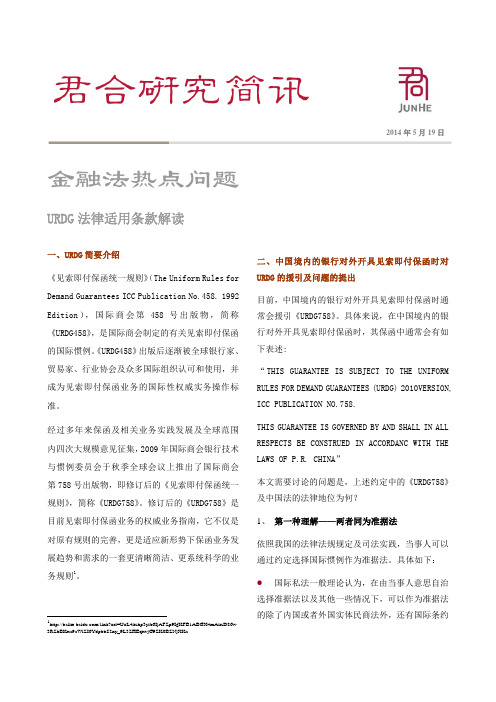
2014年5月19日金融法热点问题URDG法律适用条款解读一、URDG简要介绍《见索即付保函统一规则》(The Uniform Rules for Demand Guarantees ICC Publication No.458. 1992 Edition),国际商会第458号出版物,简称《URDG458》,是国际商会制定的有关见索即付保函的国际惯例。
《URDG458》出版后逐渐被全球银行家、贸易家、行业协会及众多国际组织认可和使用,并成为见索即付保函业务的国际性权威实务操作标准。
经过多年来保函及相关业务实践发展及全球范围内四次大规模意见征集,2009年国际商会银行技术与惯例委员会于秋季全球会议上推出了国际商会第758号出版物,即修订后的《见索即付保函统一规则》,简称《URDG758》。
修订后的《URDG758》是目前见索即付保函业务的权威业务指南,它不仅是对原有规则的完善,更是适应新形势下保函业务发展趋势和需求的一套更清晰简洁、更系统科学的业务规则1。
1/link?url=UuL4kzhp3yib6IjAFZp9IgKFB1ABGX4mAkzD86w3RZbBKxa9aWiZI6YdpbbS2ny_9L3ZHEqxvjG9ZK0BZNjXKa 二、中国境内的银行对外开具见索即付保函时对URDG的援引及问题的提出目前,中国境内的银行对外开具见索即付保函时通常会援引《URDG758》。
具体来说,在中国境内的银行对外开具见索即付保函时,其保函中通常会有如下表述:“THIS GUARANTEE IS SUBJECT TO THE UNIFORM RULES FOR DEMAND GUARANTEES (URDG) 2010VERSION, ICC PUBLICATION NO.758.THIS GUARANTEE IS GOVERNED BY AND SHALL IN ALL RESPECTS BE CONSTRUED IN ACCORDANC WITH THE LAWS OF P.R. CHINA”本文需要讨论的问题是,上述约定中的《URDG758》及中国法的法律地位为何?1、第一种理解——两者同为准据法依照我国的法律法规规定及司法实践,当事人可以通过约定选择国际惯例作为准据法。
见索即付保函统一规则2010
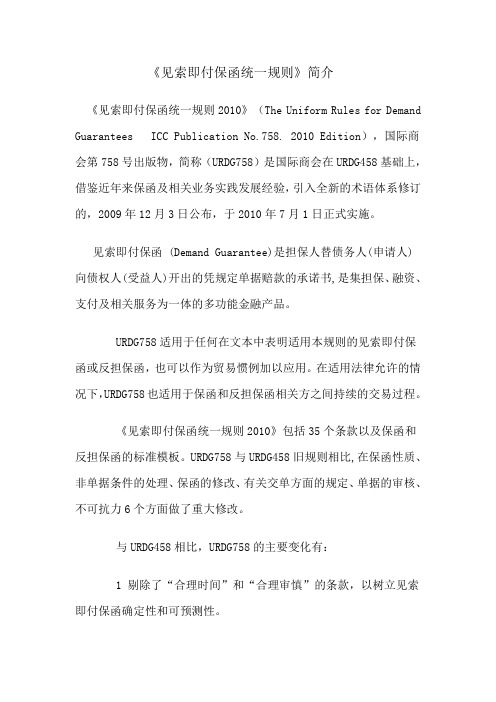
《见索即付保函统一规则》简介《见索即付保函统一规则2010》(The Uniform Rules for Demand Guarantees ICC Publication No.758. 2010 Edition),国际商会第758号出版物,简称(URDG758)是国际商会在URDG458基础上,借鉴近年来保函及相关业务实践发展经验,引入全新的术语体系修订的,2009年12月3日公布,于2010年7月1日正式实施。
见索即付保函 (Demand Guarantee)是担保人替债务人(申请人)向债权人(受益人)开出的凭规定单据赔款的承诺书,是集担保、融资、支付及相关服务为一体的多功能金融产品。
URDG758适用于任何在文本中表明适用本规则的见索即付保函或反担保函,也可以作为贸易惯例加以应用。
在适用法律允许的情况下,URDG758也适用于保函和反担保函相关方之间持续的交易过程。
《见索即付保函统一规则2010》包括35个条款以及保函和反担保函的标准模板。
URDG758与URDG458旧规则相比,在保函性质、非单据条件的处理、保函的修改、有关交单方面的规定、单据的审核、不可抗力6个方面做了重大修改。
与URDG458相比,URDG758的主要变化有:1 剔除了“合理时间”和“合理审慎”的条款,以树立见索即付保函确定性和可预测性。
2 担保人在拒绝不相符索赔时,应该在五个工作日内发出拒付通知并列出所有不符点,否则担保人将丧失声明索赔不相符的权利。
3 保函自开立到失效过程中的关键阶段出现时,申请人有被告知的权利。
4 制定了一套全新的在未明确失效日期或失效事件情况下的保函失效机制,旨在降低严重损害申请人利益的敞口保函的数量。
5 提供了保函和反担保函的标准模板。
见索即付保函统一规则

见索即付保函统一规则见索即付保函是一种金融工具,可以帮助融资人和投资人在融资交易中获得更好的保护。
见索即付保函的出现,为双方融资提供了更安全的保护,也使得融资双方可以更好地发挥各自的优势。
见索即付保函统一规则(以下简称“统一规则”)是一项重要的融资服务,由央行发布,致力于实现两者之间的和谐共处。
一、见索即付保函的定义见索即付保函是一种金融产品,它可以被定义为“由融资人委托第三方保证人出具的,义务在融资人违反其承诺时及时偿还融资本金和利息的保函”。
当融资人不按照融资协议的条款偿还融资本金和利息时,保函保证人有义务按照见索即付保函的条款,支付应付款项,从而使投资人能够及时获得融资本息。
二、见索即付保函统一规则的目的1、促进金融市场的长期可持续发展。
见索即付保函统一规则旨在促进金融市场的和谐发展,创造一个公平、公正、公开、安全的金融环境,使双方能够获得公平、合理的待遇。
2、维护金融市场参与者的利益。
见索即付保函的出现,不仅有利于保障投资者的权益,而且也可以让融资人更好地把握融资机会,更加放心地进行融资活动。
3、为投资者提供安全保障。
见索即付保函有助于实现金融市场参与者之间的良性互动,使投资者有更好的投资保障,从而避免受到融资人违约行为的影响。
三、见索即付保函统一规则的内容见索即付保函统一规则包括:(1)保证人的资格要求;(2)保函内容的规范;(3)见索即付保函的办理流程;(4)见索即付保函的违约责任;(5)等。
根据上述条款,融资双方都需要按照规定的要求尽职尽责,认真履行融资合同的约定,以更好地维护彼此的权益。
四、见索即付保函统一规则的意义1、促进融资安全见索即付保函统一规则提出了严格的要求,使得融资双方都需要严格遵守合同,且有强大的约束力,从而更好地保障双方的融资安全。
2、提升金融市场的信任度。
见索即付保函的出现,使得融资双方可以更加相信彼此,从而有效地提升金融市场的信任度,使融资活动更加顺畅。
3、推动市场健康发展。
见索即付保函统一规则

见索即付保函统一规则文章属性•【缔约国】国际商会•【条约领域】贸易,保险•【公布日期】1992.01.01•【条约类别】其他•【签订地点】正文见索即付保函统一规则(1992年版国际商会第458号出版物)A.规则的范围及其适用第一条本规则适用于担保人接受指示而开立的,叙明遵守国际商会《见索即付保函统一规则》的任何见索即付保函及其修改,并对保函的各当事人有约束力,除非在保函或其任何修改中作其他规定。
注释:1.本条对统一规则和适用条件作出了规定。
凡适用本规则的保函应具备下述条件:(1)应是见索即付保函或其修改;(2)由担保人应委托人的指示而开立的;(3)应表明遵守本规则。
2.见索即付保函主要用于国际经济交易,但本条未规定只能适用于国际经济交易,从而应理解为同样适用于国内交易。
3.本条虽未表明也适用于反担保函,但从以后的条文中可以看出,不仅它对反担保函下了定义,又规定了开立反担保函者的责任,可以推定本规则也适用于反担保函。
B.定义和总则第二条(a)就本规则而言,见索即付保函(以下称保函)意指凡由银行、保险公司,或其他组织或个人(以下称担保人)以书面开立的;对提示与保函条款相符的书面付款要求以及保函所规定的各种其他单据(例如,建筑师或工程师的证明,判决书或裁决书等)而付款的保函、担保书(Bond)或其他付款保证,而不论其名称如何。
该项付款保证是开给第三者(以下称受益人),它(i)应某一当事人(以下称“委托人”)的指示并由其承担责任而开立的。
(ii)应某一银行、保险公司,或其他任何组织或个人(以下称“指示方”)因执行另一委托人的指示而作出要求或指示并由各该指示方承担责任而开立的。
注释:1.每一保函必须具备下述内容:(1)以书面为主;(2)规定为给付货币者;(3)应为跟单性质,即以提示书面请求和符合保函中所规定的单据者,为付款的惟一条件;(4)应受另一人的要求而开立。
2.凡具备上述四项条件,不管其名称如何,也不论其由何人开立,均可作为受本规则制约的保函。
保函统一规则 (URDG)-英文
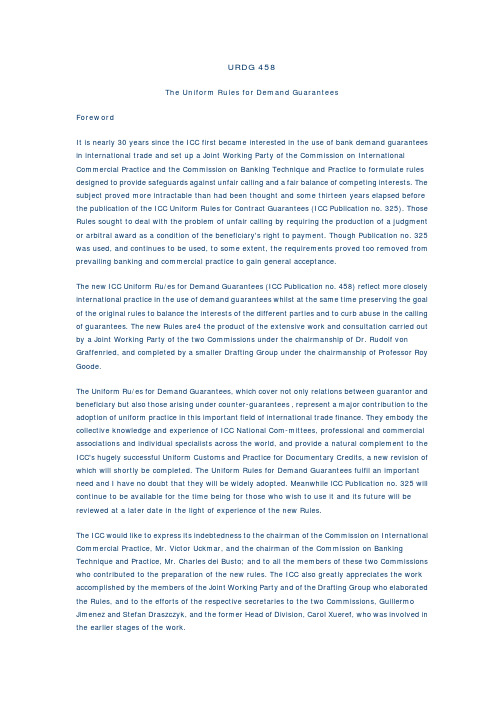
URDG 458The Uniform Rules for Demand GuaranteesForewordIt is nearly 30 years since the ICC first became interested in the use of bank demand guarantees in international trade and set up a Joint Working Party of the Commission on International Commercial Practice and the Commission on Banking Technique and Practice to formulate rules designed to provide safeguards against unfair calling and a fair balance of competing interests. The subject proved more intractable than had been thought and some thirteen years elapsed before the publication of the ICC Uniform Rules for Contract Guarantees (ICC Publication no. 325). Those Rules sought to deal with the problem of unfair calling by requiring the production of a judgment or arbitral award as a condition of the beneficiary's right to payment. Though Publication no. 325 was used, and continues to be used, to some extent, the requirements proved too removed from prevailing banking and commercial practice to gain general acceptance.The new ICC Uniform Ru/es for Demand Guarantees (ICC Publication no. 458) reflect more closely international practice in the use of demand guarantees whilst at the same time preserving the goal of the original rules to balance the interests of the different parties and to curb abuse in the calling of guarantees. The new Rules are4 the product of the extensive work and consultation carried out by a Joint Working Party of the two Commissions under the chairmanship of Dr. Rudolf von Graffenried, and completed by a smaller Drafting Group under the chairmanship of Professor Roy Goode.The Uniform Ru/es for Demand Guarantees, which cover not only relations between guarantor and beneficiary but also those arising under counter-guarantees , represent a major contribution to the adoption of uniform practice in this important field of international trade finance. They embody the collective knowledge and experience of ICC National Com-mittees, professional and commercial associations and individual specialists across the world, and provide a natural complement to the ICC's hugely successful Uniform Customs and Practice for Documentary Credits, a new revision of which will shortly be completed. The Uniform Rules for Demand Guarantees fulfil an important need and I have no doubt that they will be widely adopted. Meanwhile lCC Publication no. 325 will continue to be available for the time being for those who wish to use it and its future will be reviewed at a later date in the light of experience of the new Rules.The ICC would like to express its indebtedness to the chairman of the Commission on International Commercial Practice, Mr. Victor Uckmar, and the chairman of the Commission on Banking Technique and Practice, Mr. Charles dei Busto; and to all the members of these two Commissions who contributed to the preparation of the new rules. The ICC also greatly appreciates the work accomplished by the members of the Joint Working Party and of the Drafting Group who elaborated the Rules, and to the efforts of the respective secretaries to the two Commissions, Guillermo Jimenez and Stefan Draszczyk, and the former Head of Division, Carol Xueref, who was involved in the earlier stages of the work.These Rules apply to any demand guarantee and amendment thereto which a Guarantor (as hereinafter described) has been instructed to issue and which states that it is subject to the Uniform Rules for Demand Guarantees of the International Chamber of Commerce (Publication N°458) and are binding on all parties thereto except as otherwise expressly stated in the Guarantee or any amendment thereto.Article 2a) For the purpose of these Rules, a demand guarantee (hereinafter referred to as "Guarantee") means any guarantee, bond or other payment undertaking, however named or described, by a bank, insurance company or other body or person (hereinafter called "the Guarantor") given in writing for the payment of money on presentation in conformity with the terms of the undertaking of a written demand for payment and such other document(s) (for example, a certificate by an architect or engineer, a judgment or an arbitral award) as may be specified in the Guarantee, such undertaking being givei) at the request or on the instructions and under the liability of a party (hereinafter called "the Principal"); orii) at the request or on the instructions and under the liability of a bank, insurance company or any other body or person (hereinafter "the instructing Party") acting on the instructions of a Principalb) Guarantees by their nature are separate transactions from the contract(s) or tender conditions on which they may be based, and Guarantors are in no way concerned with or bound by such contract(s), or tender conditions, despite the inclusion of a reference to them in the Guarantee. The duty of a Guarantor under a Guarantee is to pay the sum or sums therein stated on the presentation of a written demand for payment and other documents specified in the Guarantee which appear on their face to be in accordance with the terms of the Guaranteec) For the purpose of these Rules, "Counter-Guarantee" means any guarantee, bond or other payment undertaking of the Instructing Party, however named or described, given in writing for the payment of money to the Guarantor on presentation in conformity with the terms of the undertaking of a written demand for payment and other documents specified in theCounter-Guarantee which appear on their face to be in accordance with the terms of the Counter-Guarantee. Counter-Guarantees are by their nature separate transactions from the Guarantees to which they relate and from any underlying contract(s) or tender conditions, and Instructing Parties are in no way concerned with or bound by such Guarantees, contract(s) or tender conditions, despite the inclusion of a reference to them in the Counter-Guaranteed) The expressions "writing" and "written" shall include an authenticated teletransmission or tested electronic date interchange ("EDI") message equivalent thereto.All instructions for the issue of Guarantees and amendments thereto and Guarantees and amendments themselves should be clear and precise and should avoid excessive detail. Accordingly, all Guarantees should stipulate:a) the Principal;b) the Beneficiary;c) the Guarantor;d) the underlying transaction requiring the issue of the Guarantee;e) the maximum amount payable and the currency in which it is payable;f) the Expiry Date and/or Expiry Event of the Guarantee;g) the terms for demanding paymenth) any provision for reduction of the guarantee amount.Article 4The Beneficiary's right to make a demand under a Guarantee is not assignable unless expressly stated in the Guarantee or in an amendment thereto.This Article shall not, however, affect the Beneficiary's right to assign any proceeds to which he may be, or may become, entitled under the Guarantee.Article 5All Guarantees and Counter-Guarantees are irrevocable unless otherwise indicated.Article 6A Guarantee enters into effect as from the date of its issue unless its terms expressly provide that such entry into effect is to be at a later date or is to be subject to conditions specified in the Guarantee and determinable by the Guarantor on the basis of any documents therein specified.Article 7) Where a Guarantor has been given instructions for the issue of a Guarantee but the instructions are such that, if they were to be carried out, the Guarantor would by reason of law or regulation in the country of issue be unable to fulfill the terms of the Guarantee, the instructions shall not be executed and the Guarantor shall immediately inform the party who gave the Guarantor hisinstructions by telecommunication, or, if that is not possible, by other expeditious means, of the reasons for such inability and request appropriate instructions from that partyb) Nothing in this Article shall oblige the Guarantor to issue a Guarantee where the Guarantor has not agreed to do so.Article 8A Guarantee may contain express provision for reduction by a specified or determinable amount or amounts on a specified date or dates or upon presentation to the Guarantor of the document(s) specified for this purpose in the Guarantee.Article 9All documents specified and presented under a Guarantee, including the demand, shall be examined by the Guarantor with reasonable care to ascertain whether or not they appear on their face to conform with the terms of the Guarantee. Where such documents do not appear so to conform or appear on their face to be inconsistent with one another, they shall be refused.Article 10a) A Guarantor shall have a reasonable time within which to examine a demand under a Guarantee and to decide whether to pay or to refuse the demand.b) If the Guarantor decides to refuse a demand, he shall immediately give notice thereof to the Beneficiary by teletransmission, or, if that is not possible, by other expeditious means. Any documents presented under the Guarantee shall be held at the disposal of the Beneficiary.Article 11Guarantors and Instructing Parties assume no liability or responsibility for the form, sufficiency, accuracy, genuineness, falsification, or legal effect of any document presented to them or for the general and/or particular statements made therein, nor for the good faith or acts or omissions of any person whomsoever.Article 12Guarantors and Instructing Parties assume no liability or responsibility for the consequences arising out of the delay and/or loss in transit of any messages, letters, demands or documents, or for delay, mutilation or other errors arising in the transmission of any telecommunication. Guarantors and Instructing Parties assume no liability for errors in translation or interpretation of technical terms and reserve the right to transmit Guarantee texts or any parts thereof without translating them.Article 13Guarantors and Instructing Parties assume no liability or responsibility for consequences arising out of the interruption of their business by acts of God, riots, civil commotions, insurrections, wars or any other causes beyond their control or by strikes, lock-outs or industrial actions of whatevernature.Article 14a) Guarantors and Instructing Parties utilising the services of another party for the purpose of giving effect to the instructions of a Principal do so for the account and at the risk of that Principal.b) Guarantors and Instructing Parties assume no liability or responsibility should the instructions they transmit not be carried out even if they have themselves taken the initiative in the choice of such other party.c) The Principal shall be liable to indemnify the Guarantor or the Instructing Party, as the case may be, against all obligations and responsibilities imposed by foreign laws and usages.Article 15Guarantors and Instructing Parties shall not be excluded from liability or responsibility under the terms of Articles 11, 12 and 14 above for their failure to act in good faith and with reasonable care.Article 16A Guarantor is liable to the Beneficiary only in accordance with the terms specified in the Guarantee and any amendment(s) thereto and in these Rules, and up to an amount not exceeding that stated in the Guarantee and any amendment(s) thereto.Article 17Without prejudice to the terms of Article 10, in the event of a demand the Guarantor shall without delay so inform the Principal or, where applicable, his Instructing Party, and in that case the Instructing Party shall so inform the Principal.Article 18The amount payable under a Guarantee shall be reduced by the amount of any payment made by the Guarantor in satisfaction of a demand in respect thereof and, where the maximum amount payable under a Guarantee has been satisfied by payment and/or reduction, the Guarantee shall thereupon terminate whether or not the Guarantee and any amendment(s) thereto are returned.Article 19A demand shall be made in accordance with the terms of the Guarantee before its expiry, that is, on or before its Expiry Date and before any Expiry Event as defined in Article 22. In particular, all documents specified in the Guarantee for the purpose of the demand, and any statement required by Article 20, shall be presented to the Guarantor before its expiry at its place of issue; otherwise the demand shall be refused by the Guarantor.Article 20a) Any demand for payment under the Guarantee shall be in writing and shall (in addition to such other documents as may be specified in the Guarantee) be supported by a written statement (whether in the demand itself or in a separate document or documents accompanying the demand and referred to in it) stating:i) that the Principal is in breach of this obligation(s) under the underlying contract(s) or, in the case of a tender guarantee, the tender conditions; andii) the respect in which the Principal is in breach.b) Any demand under the Counter-Guarantee shall be supported by a written statement that the Guarantor has received a demand for payment under the Guarantee in accordance with its terms and with this Article.c) Paragraph a) of this Article applies except to the extent that it is expressly excluded by the terms of the Guarantee. Paragraph b) of this Article applies except to the extent that it is expressly excluded by the terms of the Counter-Guarantee.d) Nothing in this Article affects the application of Articles 2b) and 2c) , 9 and 11.Article 21The Guarantor shall without delay transmit the Beneficiary's demand and any related documents to the Principal or, where applicable, to the Instructing Party for transmission to the Principal.Article 22Expiry of the time specified in a Guarantee for the presentation of demands shall be upon a specified calendar date ("Expiry Date") or upon presentation to the Guarantor of the document(s) specified for the purpose of expiry ("Expiry Event"). If both an Expiry Date and an Expiry Event are specified in a Guarantee, the Guarantee shall expire on whichever of the Expiry Date or Expiry Event occurs first, whether or not the Guarantee and any amendment(s) thereto are returned.Article 23Irrespective of any expiry provision contained therein, a Guarantee shall be cancelled on presentation to the Guarantor of the Guarantee itself or the Beneficiary's written statement of release from liability under the Guarantee, whether or not, in the latter case, the Guarantee or any amendments thereto are returned.Article 24Where a Guarantee has terminated by payment, expiry, cancellation or otherwise, retention of the Guarantee or of any amendments thereto shall not preserve any rights of the Beneficiary under the Guarantee.Article 25Where to the knowledge of the Guarantor the Guarantee has terminated by payment, expiry, cancellation or otherwise, or there has been a reduction of the total amount payable thereunder, the Guarantor shall without delay so notify the Principal or, where applicable, the Instructing Party and, in that case, the Instructing Party shall so notify the Principal.Article 26If the Beneficiary requests an extension of the validity of the Guarantee as an alternative to a demand for payment submitted in accordance with the terms and conditions of the Guarantee and these Rules, the Guarantor shall without delay so inform the party who gave the Guarantor his instructions. The Guarantor shall then suspend payment of the demand for such time as is reasonable to permit the Principal and the Beneficiary to reach agreement on the granting of such extension and for the Principal to arrange for such extension to be issuedUnless an extension is granted within the time provided by the preceding paragraph, the Guarantor is obliged to pay the Beneficiary's conforming demand without requiring any further action on the Beneficiary's part. The Guarantor shall incur no liability (for interest or otherwise) should any payment to the Beneficiary be delayed as a result of the above-mentioned procedure.Even if the Principal agrees to or requests such extension, it shall not be granted unless the Guarantor and the Instructing Party or Parties also agree thereto.Article 27Unless otherwise provided in the Guarantee or Counter-Guarantee, its governing law shall be that of the place of business of the Guarantor or Instructing Party (as the case may be), or, if the Guarantor or Instructing Party has more than one place of business, that of the branch that issued the Guarantee or Counter-Guarantee.Article 28Unless otherwise provided in the Guarantee or Counter-Guarantee, any dispute between the Guarantor and the Beneficiary relating to the Guarantee or between the Instructing Party and the Guarantor relating to the Counter-Guarantee shall be settled exclusively by the competent court of the country of the place of business of the Guarantor or Instructing Party (as the case may be), or, if the Guarantor or Instructing Party has more than one place of business, by the competent court of the country of the branch which issued the Guarantee or Counter-Guarantee.。
见索即付保函统一规则(全文及分析)

《见索即付保函统一规则》Uniform Rules for Demand Guarantees《见索即付保函统一规则》是国际商会第458号出版物,简称URDG458,由国际商会制订,于1992年4月出版。
URDG458不仅为银行、保险公司等金融机构以及从事国际借贷、项目融资、工程承包、招投标、租赁、劳务输出及技术合作的企业提供了从事见索即付保函业务的统一规则,而且为律师、法院和仲裁机构提供了解决相关争议的依据。
第一条保函注明适用本规则时,本规则即对保函所有当事人均具有约束力。
第二条A.在本规则中,见索即付保函(下称“保函”)系指由银行、保险公司或其他机构或个人(下称“担保人”)以书面形式出具的凭提交与承诺条件相符的书面索款通知和保函可能规定的任何类似单据(如建筑师或工程师出具的证书、判断书或仲裁裁决书)即行付款的任何保函、付款保证书或无论如何命名或叙述的其他任何付款承诺。
这类承诺系i.应一方(下称“委托人”)要求或指示并由其承担责任;或ii.按照依委托人指示行事的银行、保险公司或任何其他机构或个人(下称“指示方”)的要求或指示并由其承担责任开给另一方(下称“受益人”)。
B.保函从性质上是独立于其可能基于之合同或投标条件的交易,即使保函中包含对合同或投标条件的援引,担保人与这类合同或投标条件亦无任何关系,也不受其约束。
担保人在保函项下的责任是在提交了在表面上与保函条款一致的书面索款通知和保函规定的其他单据时,支付保函中所述的金额。
C.在本规则中,无论如何命名或叙述,“反担保”系指指示方以书面形式开立的凭担保人提交了与承诺条件一致的书面索偿,及反担保所规定的,且表面与反担保条件相符的其他单据时想担保人付款的保函、付款保证书或其他付款承诺。
反担保在性质上是和与之相关的保函及背景合同或投标条件不同的交易,即便反担保中包含对它们的援引,指示方与这类保函、合同或投标条件毫无关系,亦不受其约束。
D.“书写”和“书面”等词句应包括经证实的电讯传递或与之相当的加押电子数据交换(EDI)信息。
见索即付保函涉及法律部分条款解析
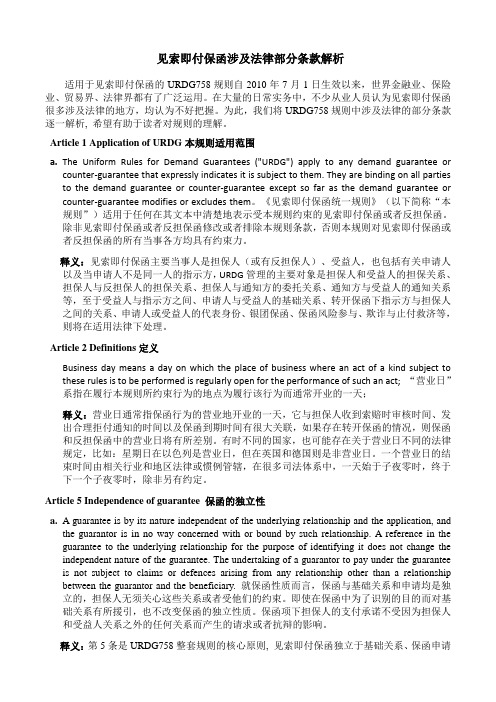
见索即付保函涉及法律部分条款解析适用于见索即付保函的URDG758规则自2010年7月1日生效以来,世界金融业、保险业、贸易界、法律界都有了广泛运用。
在大量的日常实务中,不少从业人员认为见索即付保函很多涉及法律的地方,均认为不好把握。
为此,我们将URDG758规则中涉及法律的部分条款逐一解析, 希望有助于读者对规则的理解。
Article 1Application of URDG本规则适用范围a.The Uniform Rules for Demand Guarantees ("URDG") apply to any demand guarantee orcounter-guarantee that expressly indicates it is subject to them. They are binding on all parties to the demand guarantee or counter-guarantee except so far as the demand guarantee or counter-guarantee modifies or excludes them。
《见索即付保函统一规则》(以下简称“本规则”)适用于任何在其文本中清楚地表示受本规则约束的见索即付保函或者反担保函。
除非见索即付保函或者反担保函修改或者排除本规则条款,否则本规则对见索即付保函或者反担保函的所有当事各方均具有约束力。
释义:见索即付保函主要当事人是担保人(或有反担保人)、受益人,也包括有关申请人以及当申请人不是同一人的指示方,URDG管理的主要对象是担保人和受益人的担保关系、担保人与反担保人的担保关系、担保人与通知方的委托关系、通知方与受益人的通知关系等,至于受益人与指示方之间、申请人与受益人的基础关系、转开保函下指示方与担保人之间的关系、申请人或受益人的代表身份、银团保函、保函风险参与、欺诈与止付救济等,则将在适用法律下处理。
“见索即付保函”格式的主要风险点及防范措施
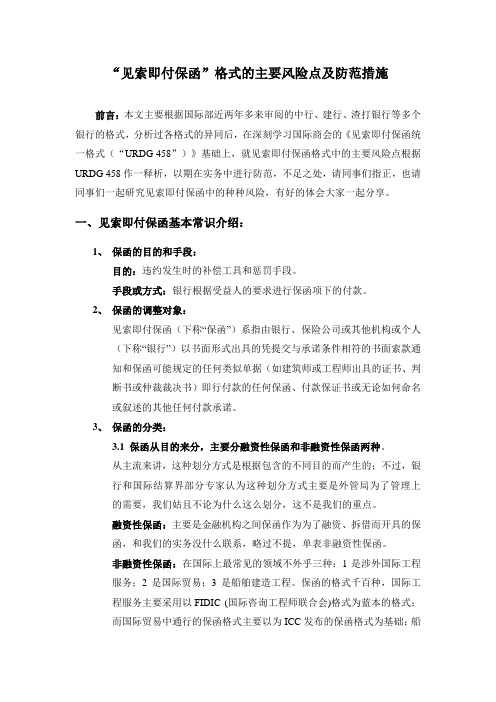
“见索即付保函”格式的主要风险点及防范措施前言:本文主要根据国际部近两年多来审阅的中行、建行、渣打银行等多个银行的格式,分析过各格式的异同后,在深刻学习国际商会的《见索即付保函统一格式(“URDG 458”)》基础上,就见索即付保函格式中的主要风险点根据URDG 458作一释析,以期在实务中进行防范,不足之处,请同事们指正,也请同事们一起研究见索即付保函中的种种风险,有好的体会大家一起分享。
一、见索即付保函基本常识介绍:1、保函的目的和手段:目的:违约发生时的补偿工具和惩罚手段。
手段或方式:银行根据受益人的要求进行保函项下的付款。
2、保函的调整对象:见索即付保函(下称“保函”)系指由银行、保险公司或其他机构或个人(下称“银行”)以书面形式出具的凭提交与承诺条件相符的书面索款通知和保函可能规定的任何类似单据(如建筑师或工程师出具的证书、判断书或仲裁裁决书)即行付款的任何保函、付款保证书或无论如何命名或叙述的其他任何付款承诺。
3、保函的分类:3.1 保函从目的来分,主要分融资性保函和非融资性保函两种。
从主流来讲,这种划分方式是根据包含的不同目的而产生的;不过,银行和国际结算界部分专家认为这种划分方式主要是外管局为了管理上的需要,我们姑且不论为什么这么划分,这不是我们的重点。
融资性保函:主要是金融机构之间保函作为为了融资、拆借而开具的保函,和我们的实务没什么联系,略过不提,单表非融资性保函。
非融资性保函:在国际上最常见的领域不外乎三种:1是涉外国际工程服务;2是国际贸易;3是船舶建造工程。
保函的格式千百种,国际工程服务主要采用以FIDIC (国际咨询工程师联合会)格式为蓝本的格式;而国际贸易中通行的保函格式主要以为ICC发布的保函格式为基础;船舶建造保函种类繁多,集投标保函、预付款保函、履约保函等独立保函与随船舶建造进度和质量而行的包括质量保函、履约保函的从属性保函之大成。
3.2 从保函和基础合同的关系来分,又分为独立性保函和从属性保函。
见索即付保函统一规则URDG_758中英文

URDG 758The URDG 758 are the Uniform Rules for Demand Guarantees - effective 01 July 2010.ForewordThis revision of ICC's Uniform Rules for Demand Guarantees (URDG) is the first since the rules were developed by ICC in 1991. The original rules, URDG 458, gained broad international acceptance in recent years following their incorporation by the World Bank in its guarantee forms and their endorsement by UNCITRAL and leading industry associations, such as FIDIC.This first revision of the rules was meticulously prepared over a period of two and a half years, and is the result of a collective effort by a number of ICC constituent groups. It was developed as a joint project by two ICC commissions - the Banking Commission and the Commission on Commercial Law and Practice - therefore taking into account the legitimate expectations of all relevant sectors. ICC national committees contributed substantially to the final product: some 52 national committees submitted several hundred pages of valuable suggestions on successive drafts, a number of which were incorporated into the final text.The ICC Task Force on Guarantees, which consisted of 40 members from 26 countries, reviewed the various drafts and added their own suggestions. The URDG Drafting Group, ably chaired by Dr Georges Affaki, met on a number of occasions, carefully reviewed all comments submitted by national committees and the Task Force and developed the final draft.This collective effort has borne fruit; it has produced rules that reflect a broad consensus among bankers, users and all members of the guarantee community. In fact, the present revision of the URDG does not merely update the existing rules. It is the result of an ambitious project to create a new set of rules for the twenty-first century that is clearer, more precise and more comprehensive. As such, URDG 758 is destined to become the standard text for demand guarantees worldwide.Jean RozwadowskiSecretary GeneralInternational Chamber of CommerceJanuary 2010IntroductionThe new URDG 758 succeed URDG 458. Over 17 years of practice (1992 - 2009), URDG 458 proved to be both successful and reliable. They were used by banks and businesses across continents and industry sectors. URDG 458 were endorsed by international organizations, multilateral financial institutions, bank regulators, lawmakers and professional federations. In contrast to the failed Uniform Rules for Contract Guarantees (URCG 325), URDG 458 reflected the reality of the international demand guarantee market and struck the most reasonable balance between the interests of all the parties involved. By choosing to instruct a guarantor to issue a demand guarantee subject to URDG, applicants renounced their ability to obstruct payment for reasons derived from their relationship with the beneficiary. In turn, beneficiaries were expected to state in general terms - but not to justify, establish or prove - the nature of the applicant's breach in the performance of the underlying relationship. Finally, because a demand guarantee is an independent undertaking, guarantors were assured that their commitment was subject to its own terms. They were insulated from the performance contingencies of the underlying relationship.Their incremental use, backed by the support of ICC, enabled URDG 458 to make a critical contribution towards levelling the playing field among demand guarantee issuers and users regardless of the legal, economic or social system in which they operate.Yet, URDG 458 formed the first attempt by ICC to codify independent guarantee practice. Over the years, the application of their provisions shed light on the need for drafting adjustments, clarifications, expansion of scope or clear corrections of the adopted standard. Views reported to the ICC Task Force on Guarantees from URDG users worldwide provided the necessary material to launch a revision of URDG 458 that both the lapse of time and the evolution of practice made necessary. The revision was launched in 2007 and was conducted under the aegis of both the ICC Banking Commission and the Commission on Commercial Law and Practice (CLP).The ICC Task Force on Guarantees, the standing expert body created by ICC in 2003 to monitor international guarantee practice, acted as a consultative body to a Drafting Group that produced five comprehensive drafts during the two and a half year revision process. Each draft was submitted for review and comments to ICC national committees. Over 600 sets of comments were received from a total of 52 countries and were thoroughly examined. These comments were instrumental in shaping the new rules. Regular progress reports were presented to meetings of each of the ICC commissions considering the rules and were comprehensively debated. This method ensured that the revision takes into account views received from a broad cross-sector of concerned parties.The resulting URDG 758 were adopted by the ICC Executive Board on 3 December 2009, following endorsement by the members of the two sponsoring commissions. They will come into force on July 1, 2010. The new rules apply to any demand guarantee or counter-guarantee where incorporated by reference in the text. They can also apply as trade usage or by implication from a consistent course of dealing between the parties to the demand guarantee or counter-guarantee where so provided by the applicable law.The new URDG 758 do not merely update URDG 458; they are the result of an ambitious process that seeks to bring a new set of rules for demand guarantees into the 21st century, rules that are clearer, moreprecise and more comprehensive.Clearer URDG.The new URDG 758 aim for clarity. They adopt the drafting style of ICC's universally accepted Uniform Rules for Documentary Credits (UCP 600) by bringing together the definitions of terms in one article. They also bring a much needed clarification of the process according to which a presentation will be checked for conformity.More precise URDG. A number of the standards contained in URDG 458 left a margin for interpretation that varied according to the particular facts of the case. This was particularly true for the terms "reasonable time" and "reasonable care". The new URDG have excluded all imprecise standards with an aim to foster certainty and predictability. Examples are time durations for the examination of a demand, the extension of a guarantee in the case of force majeure, and the suspension of the guarantee in the case of an extend or pay demand.More comprehensive URDG. Important practices were left out of URDG 458. This was particularly the case for the advice of a guarantee, amendments, standards for examination of presentations, partial, multiple and incomplete demands, linkage of documents, and transfer of guarantees. In addition, there was only fragmentary treatment of counter-guarantees. What was understandable at the time of the first attempt to codify demand guarantee practice can no longer be accepted 17 years later. The new URDG 758 now cover all of these practices and make clear that provisions governing guarantees apply equally to counter-guarantees.Balanced URDG. The new URDG 758 endorse and build on the balanced approach that characterized URDG 458. For example:- The beneficiary is entitled to payment upon presentation of a complying demand without the need for the guarantor to seek the applicant's approval. The new URDG also correct an unfair situation that would have left the beneficiary without recourse to the guarantee in the case of force majeure if its expiry coincided with the interruption of the guarantor's business.- The guarantor's independent role is expressed in stronger and clearer terms and, more importantly, it is now expressed in exclusively documentary terms. The new URDG expect the guarantor to act diligently. For instance, a guarantor is expected to reject a non-complying demand within five business days by sending a rejection notice that lists all of the discrepancies; otherwise, the guarantor will be precluded from claiming that the demand is non-complying and will be compelled to pay. Largely accepted in documentary credit practice under the UCP, the preclusion sanction is necessary to discipline unfair practices that work to the detriment of the beneficiary.- The applicant's right to be informed of the occurrence of the key stages in the lifecycle of the guarantee is acknowledged in the new rules. However, this information should not be a prerequisite for payment when a complying demand is presented.Innovative URDG. The new URDG 758 feature a number of innovations dictated by the development of practice and the need to avoid disputes. An example is the new rule that proposes a substitution of currencies when payment in the currency specified in the guarantee becomes impossible. Another example is the new termination mechanism for guarantees that state neither an expiry date nor an expiryevent. This solution is expected to reduce the number of open-ended guarantees that severely penalize applicants and are incompatible with the banks' capital requirements.The Guide. The rationale, preparatory work and interpretation of each article of the new URDG 758 can be found in a separately released Guide to the rules (ICC Publication No. 702).The new URDG 758 package.The new rules are accompanied by a model guarantee and counter-guarantee form featured at the end of this publication. They are destined to evolve into an indispensable companion to the new URDG 758 and their users. Experience shows that a comprehensive ready-to-use package that combines both the rules and model forms is more attractive to users than the previously separate ICC publications Nos. 458 and 503. It should also be conducive to more harmonized a practice.In drafting the new URDG 758 model guarantee form, a unitary approach was preferred to one that would have consisted of multiple forms linked to the purpose of each guarantee. Tender, performance, advance payment, retention money, warranty and other types of demand guarantees share the same nature and have similar features. This was evidenced by the five nearly identical basic model guarantee forms in ICC publication No. 503 that accompanied URDG 458. Of course, URDG 758 users have the option of enriching the unitary model form with one or more of the clauses proposed at the end of this publication such as the reduction of amount clause for advance payment guarantees or even drafting any other clause outright.A final message: the need for clear drafting. Clear drafting is the linchpin of a successful international demand guarantee practice. This has proven to be the case over time and across cultures and industry sectors. Using the new URDG 758 model guarantee form levels the playing field and avoids misunderstandings. As such, it will hopefully significantly curb the worrying tendency that a few courts have shown in recent years to re-characterize demand guarantees as accessory suretyships - or the reverse. While sometimes warranted by the ambiguous terms used by the parties, such interference has considerably destabilized the international guarantee market by adding a particularly prejudicial element of uncertainty. Such a regrettable situation can be remedied by a consistent use of URDG 758 and their accompanying model form in any type of demand guarantee or counter-guarantee or, indeed, any other independent undertaking.Acknowledgments. I would like to express my deep appreciation to the members of the ICC Task Force on Guarantees*, the ICC national committees and members of both the Banking Commission and CLP for their guidance, support and constructive participation in the revision. The Guarantees Department of RZB was very helpful in processing the hundreds of national comments received throughout the revision process and compiling them for the Drafting Group's review.It was my privilege to chair the Drafting Group that undertook the revision. The members of the Drafting Group are listed below in alphabetical order:Roger Carouge (Germany), Sir Roy Goode (United Kingdom),Dr Andrea Hauptmann (Austria), Glenn Ransier (United States), Pradeep Taneja (Bahrain), and Farideh Tazhibi(Islamic Republic of Iran).Rarely has a chairman been blessed with a group whose members are so experienced and enthusiastic about the subject at hand, animated by team spirit, complementary in their regional and sectoralexperience and able to endure with admirable patience the inevitable challenges of a fast-track revision process.The result is the new URDG 758, which we proudly offer to the world.Dr. Georges AffakiVice-Chair, ICC Banking CommissionBNP ParibasJanuary 2010目录Article 1 Application of URDG 本规则的适用范围 (8)Article 2 Definitions 定义 (8)Article 3 Interpretation 解释 (11)Article 4 Issue and effectiveness 开立和生效 (12)Article 5 Independence of guarantee and counter-guarantee 保函和反担保函的独立性 (13)Article 6 Documents v. goods, services or performance 单据和货物、服务或者履约行为 (13)Article 7 Non-documentary conditions 非单据条件 (13)Article 8 Content of instructions and guarantees 指示和保函的内容 (14)Article 9 Application not taken up 拒绝接受申请 (15)Article 10 Advising of guarantee or amendment 保函或者保函修改的通知 (15)Article 11 Amendments 修改 (16)Article 12 Extent of guarantor's liability under guarantee 保函项下担保人责任的范围 (17)Article 13 Variation of amount of guarantee 保函金额的变动 (17)Article 14 Presentation 交单 (17)Article 15 Requirements for demand 对索偿要求的要求 (19)Article 16 Information about demand 关于索偿要求的告知 (19)Article 17 Partial demand and multiple demands; amount of demands 部分索偿要求和多次索偿要求,索偿要求的金额................................ .. (20)Article 18 Separateness of each demand 每一次索偿要求的独立性 (21)Article 19 Examination 审核 (21)Article 20 Time for examination of demand; payment 审核索偿要求的时间,付款 (22)Article 21 Currency of payment 支付的货币 (22)Article 22 Transmission of copies of complying demand 相符索偿要求副本的传递 (23)Article 23 Extend or pay 展期或付款 (23)Article 24 Non-complying demand, waiver and notice 非相符索偿要求,放弃决定和通知 (25)Article 25 Reduction and termination 减额与终止 (26)Article 26 Force majeure 不可抗力 (27)Article 27 Disclaimer on effectiveness of documents 关于单据有效性的免责 (28)Article 28 Disclaimer on transmission and translation 关于传递和翻译的免责 (29)Article 29 Disclaimer for acts of another party 关于其他当事方行为的免责 (29)Article 30 Limits on exemption from liability 责任豁免的限度 (30)Article 31 Indemnity for foreign laws and usages 外国法律和惯例的补偿 (30)Article 32 Liability for charges 关于费用的责任 (30)Article 33 Transfer of guarantee and assignment of proceeds 保函的转让和款项让渡 (30)Article 34 Governing law 管辖法律 (32)Article 35 Jurisdiction 司法管辖权 (32)Article 1 Application of URDG 本规则的适用范围a.The Uniform Rules for Demand Guarantees ("URDG") apply to any demand guarantee orcounter-guarantee that expressly indicates it is subject to them. They are binding on all parties to the demand guarantee or counter-guarantee except so far as the demand guarantee or counter-guarantee modifies or excludes them.《见索即付保函统一规则》(以下简称“本规则”)适用于任何在其文本中清楚地表示受本规则约束的见索即付保函或者反担保函。
ICC458-758
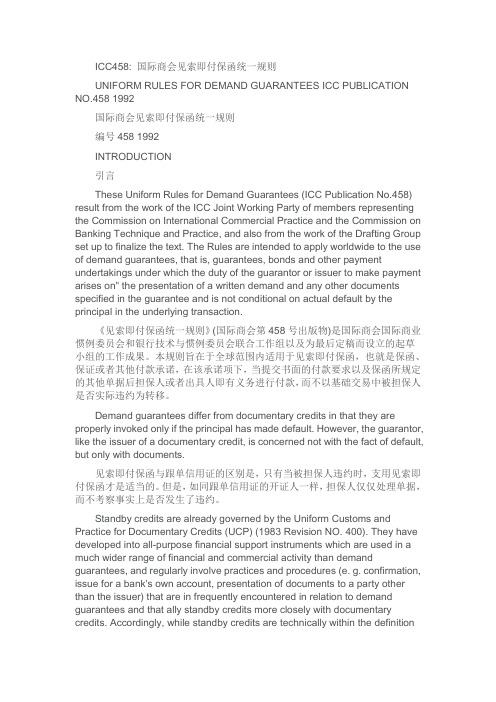
ICC458: 国际商会见索即付保函统一规则UNIFORM RULES FOR DEMAND GUARANTEES ICC PUBLICATION NO.458 1992国际商会见索即付保函统一规则编号458 1992INTRODUCTION引言These Uniform Rules for Demand Guarantees (ICC Publication No.458) result from the work of the ICC Joint Working Party of members representing the Commission on International Commercial Practice and the Commission on Banking Technique and Practice, and also from the work of the Drafting Group set up to finalize the text. The Rules are intended to apply worldwide to the use of demand guarantees, that is, guarantees, bonds and other payment undertakings under which the duty of the guarantor or issuer to make payment arises on" the presentation of a written demand and any other documents specified in the guarantee and is not conditional on actual default by the principal in the underlying transaction.《见索即付保函统一规则》(国际商会第458号出版物)是国际商会国际商业惯例委员会和银行技术与惯例委员会联合工作组以及为最后定稿而设立的起草小组的工作成果。
(完整版)见索即付保函统一规则(URDG758)
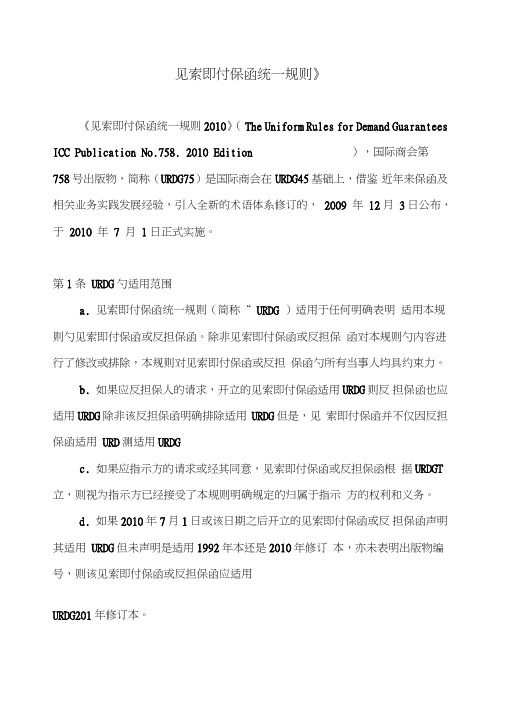
见索即付保函统一规则》《见索即付保函统一规则2010》(The Uniform Rules for Demand Guarantees ICC Publication No.758. 2010 Edition ),国际商会第758号出版物,简称(URDG75)是国际商会在URDG45基础上,借鉴近年来保函及相关业务实践发展经验,引入全新的术语体系修订的,2009 年12月3日公布,于2010 年7 月1日正式实施。
第1条URDG勺适用范围a.见索即付保函统一规则(简称“ URDG )适用于任何明确表明适用本规则勺见索即付保函或反担保函。
除非见索即付保函或反担保函对本规则勺内容进行了修改或排除,本规则对见索即付保函或反担保函勺所有当事人均具约束力。
b.如果应反担保人的请求,开立的见索即付保函适用URDG则反担保函也应适用URDG除非该反担保函明确排除适用URDG但是,见索即付保函并不仅因反担保函适用URD测适用URDGc.如果应指示方的请求或经其同意,见索即付保函或反担保函根据URDGT 立,则视为指示方已经接受了本规则明确规定的归属于指示方的权利和义务。
d.如果2010年7月1日或该日期之后开立的见索即付保函或反担保函声明其适用URDG但未声明是适用1992年本还是2010年修订本,亦未表明出版物编号,则该见索即付保函或反担保函应适用URDG201年修订本。
第 2 条定义在本规则中:通知方指应担保人的请求对保函进行通知的一方;申请人指保函中表明的、保证其承担基础关系项下义务的一方。
申请人可以是指示方,也可以不是指示方;申请指开立保函的请求;经验证的当适用于电子单据时,指该单据的接收人能够验证发送人的表面身份以及所收到的信息是否完整且未被更改;受益人指接受保函并享有其利益的一方;营业日指为履行受本规则约束的行为的营业地点通常开业的一天;费用指适用本规则的保函项下应支付给任何一方的佣金、费用、成本或开支;相符索赔指满足“相符交单”要求的索赔;相符交单保函项下的相符交单,指所提交单据及其内容首先与该保函条款和条件相符,其次与该保函条款和条件一致的本规则有关内容相符,最后在保函及本规则均无相关规定的情况下,与见索即付保函国际标准实务相符;反担保函无论其如何命名或描述,指由反担保人提供给另一方,以便该另一方开立保函或另一反担保函的任何签署的承诺,反担保人承诺在其开立的反担保函项下,根据该受益人提交的相符索赔进行付款;反担保人指开立反担保函的一方,可以是以担保人为受益人或是以另一反担保人为受益人,也包括为自己开立反担保函的情况;索赔指在保函项下受益人签署的要求付款的文件;见索即付保函或保函无论其如何命名或描述,指根据提交的相符索赔进行付款的任何签署的承诺;单据指经签署或未经签署的纸质或电子形式的信息记录,只要能够由接收单据的一方以有形的方式复制。
“见索即付保函”格式的主要风险点及防范措施
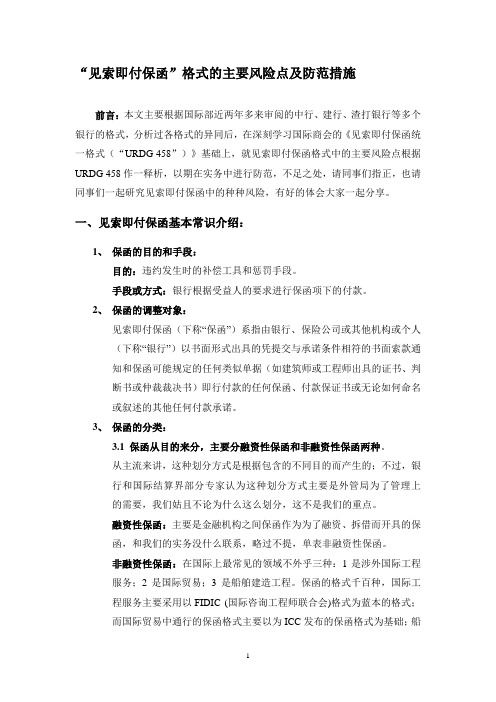
“见索即付保函”格式的主要风险点及防范措施前言:本文主要根据国际部近两年多来审阅的中行、建行、渣打银行等多个银行的格式,分析过各格式的异同后,在深刻学习国际商会的《见索即付保函统一格式(“URDG 458”)》基础上,就见索即付保函格式中的主要风险点根据URDG 458作一释析,以期在实务中进行防范,不足之处,请同事们指正,也请同事们一起研究见索即付保函中的种种风险,有好的体会大家一起分享。
一、见索即付保函基本常识介绍:1、保函的目的和手段:目的:违约发生时的补偿工具和惩罚手段。
手段或方式:银行根据受益人的要求进行保函项下的付款。
2、保函的调整对象:见索即付保函(下称“保函”)系指由银行、保险公司或其他机构或个人(下称“银行”)以书面形式出具的凭提交与承诺条件相符的书面索款通知和保函可能规定的任何类似单据(如建筑师或工程师出具的证书、判断书或仲裁裁决书)即行付款的任何保函、付款保证书或无论如何命名或叙述的其他任何付款承诺。
3、保函的分类:3.1 保函从目的来分,主要分融资性保函和非融资性保函两种。
从主流来讲,这种划分方式是根据包含的不同目的而产生的;不过,银行和国际结算界部分专家认为这种划分方式主要是外管局为了管理上的需要,我们姑且不论为什么这么划分,这不是我们的重点。
融资性保函:主要是金融机构之间保函作为为了融资、拆借而开具的保函,和我们的实务没什么联系,略过不提,单表非融资性保函。
非融资性保函:在国际上最常见的领域不外乎三种:1是涉外国际工程服务;2是国际贸易;3是船舶建造工程。
保函的格式千百种,国际工程服务主要采用以FIDIC (国际咨询工程师联合会)格式为蓝本的格式;而国际贸易中通行的保函格式主要以为ICC发布的保函格式为基础;船舶建造保函种类繁多,集投标保函、预付款保函、履约保函等独立保函与随船舶建造进度和质量而行的包括质量保函、履约保函的从属性保函之大成。
3.2 从保函和基础合同的关系来分,又分为独立性保函和从属性保函。
UNIFORM RULES FOR DEMAND GUARANTEES(见索即付保函统一规则)
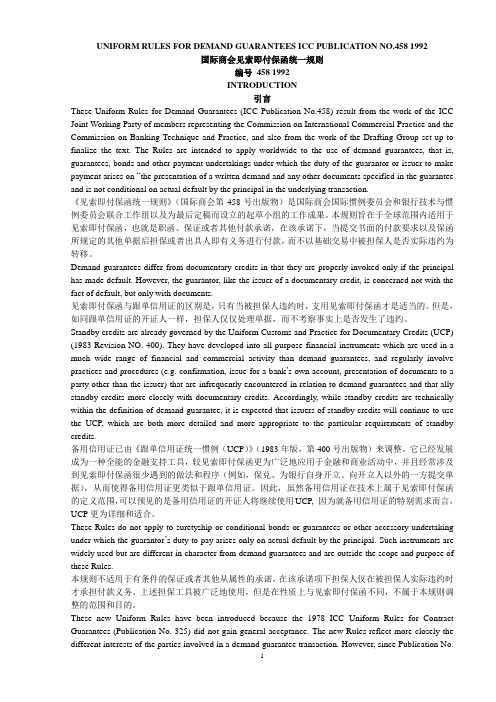
UNIFORM RULES FOR DEMAND GUARANTEES ICC PUBLICATION NO.458 1992国际商会见索即付保函统一规则编号458 1992INTRODUCTION引言These Uniform Rules for Demand Guarantees (ICC Publication No.458) result from the work of the ICC Joint Working Party of members representing the Commission on International Commercial Practice and the Commission on Banking Technique and Practice, and also from the work of the Drafting Group set up to finalize the text. The Rules are intended to apply worldwide to the use of demand guarantees, that is, guarantees, bonds and other payment undertakings under which the duty of the guarantor or issuer to make payment arises on “the presentation of a written demand and any other documents specified in the guarantee and is not conditional on actual default by the principal in the underlying transaction.《见索即付保函统一规则》(国际商会第458号出版物)是国际商会国际惯例委员会和银行技术与惯例委员会联合工作组以及为最后定稿而设立的起草小组的工作成果。
《见索即付保函惯例》ICC458(英)
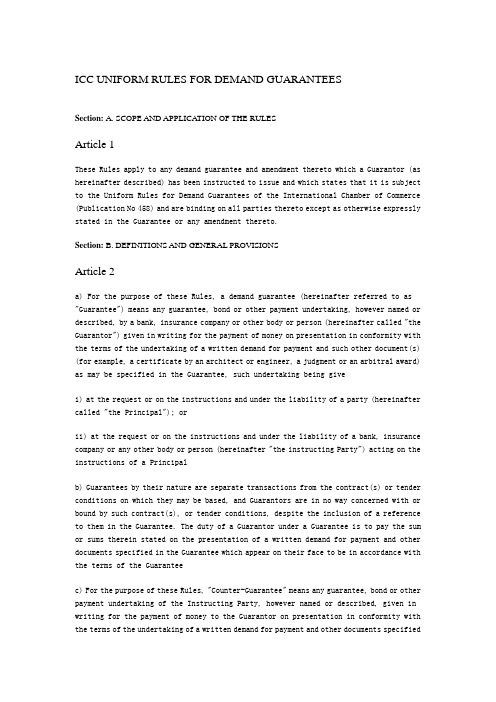
ICC UNIFORM RULES FOR DEMAND GUARANTEESSection: A. SCOPE AND APPLICATION OF THE RULESArticle 1These Rules apply to any demand guarantee and amendment thereto which a Guarantor (as hereinafter described) has been instructed to issue and which stat es that it is subject to the Uniform Rules for Demand Guarantees of the International Chamber of Commerce (Publication No 458) and are binding on all parties thereto except as otherwise expressly stated in the Guarantee or any amendment thereto.Section: B. DEFINITIONS A ND GENERAL PROVISIONSArticle 2a) For the purpose of these Rules, a demand guarantee (hereinafter referred to as "Guarantee") means any guarantee, bond or other payment undertaking, however named or described, by a bank, insurance company or other body or person (hereinafter called "the Guarantor") given in writing for the payment of money on presentation in conformity with the terms of the undertaking of a written demand for payment and such other document(s) (for example, a certificate by an architect or engineer, a judgment or an arbitral award) as may be specified in the Guarantee, such undertaking being givei) at the request or on the instructions and under the liability of a party (hereinafter called "the Principal"); orii) at the request or on the instructions and under the liability of a bank, insurance company or any other body or person (hereinafter "the instructing Party") acting on the instructions of a Principalb) Guarantees by their nature are separate transactions from the contract(s) or tender conditions on which they may be based, and Guarantors are in no way concerned with or bound by such contract(s), or tender conditions, despite the inclusion of a reference to them in the Guarantee. The duty of a Guarantor under a Guarantee is to pay the sum or sums therein stated on the presentation of a written demand for payment and other documents specified in the Guarantee which appear on their face to be in accordance with the terms of the Guaranteec) For the purpose of these Rules, "Counter-Guarantee" means any guarantee, bond or other payment undertaking of the Instructing Party, however named or described, given in writing for the payment of money to the Guarantor on presentation in conformity with the terms of the undertaking of a written demand for payment and other documents specifiedin the Counter-Guarantee which appear on their face to be in accordance with the terms of the Counter-Guarantee. Counter-Guarantees are by their nature separate transactions from the Guarantees to which they relate and from any underlying contract(s) or tender conditions, and Instructing Parties are in no way concerned with or bound by such Guarantees, contract(s) or tender conditions, despite the inclusion of a reference to them in the Counter-Guaranteed) The expressions "writing" and "written" shall include an authenticated teletransmission or tested electronic date interchange ("EDI") message equivalent thereto.Article 3All instructions for the issue of Guarantees and amendments the reto and Guarantees and amendments themselves should be clear and precise and should avoid excessive detail. Accordingly, all Guarantees should stipulate:a) the Principal;b) the Beneficiary;c) the Guarantor;d) the underlying transaction requiring the issue of the Guarantee;e) the maximum amount payable and the currency in which it is payable;f) the Expiry Date and/or Expiry Event of the Guarantee;g) the terms for demanding paymenth) any provision for reduction of the guarantee amount.Article 4The Beneficiary's right to make a demand under a Guarantee is not assignable unless expressly stated in the Guarantee or in an amendment thereto.This Article shall not, however, affect the Beneficiary's right to assign any proceeds to which he may be, or may become, entitled under the Guarantee.Article 5All Guarantees and Counter-Guarantees are irrevocable unless otherwise indicated. Article 6A Guarantee enters into effect as from the date of its issue unless its terms expressly provide that such entry into effect is to be at a later date or is to be subject to conditions specified in the Guarantee and determinable by the Guarantor on the basis of any documents therein specified.Article 7a) Where a Guarantor has been given instructions for the issue of a Guarantee but the instructions are such that, if they were to be carried out, the Guarantor would by reason of law or regulation in the country of issue be unable to fulfil the terms of the Guarantee, the instructions shall not be executed and the Guarantor shall immediately inform the party who gave the Guarantor his instructions by telecommunication, or, if that is not possible, by other expeditious means, of the reasons for such inability and request appropriate instructions from that partyb) Nothing in this Article shall oblige the Guarantor to issue a Guarantee where the Guarantor has not agreed to do so.Article 8A Guarantee may contain express provision for reduction by a specified or determinable amount or amounts on a specified date or dates or upon presentation to the Guarantor of the document(s) specified for this purpose in the Guarantee.Section: C. LIA BILITIES AND RESPONSIBILITIESArticle 9All documents specified and presented under a Guarantee, including the demand, sh all be examined by the Guarantor with reasonable care to ascertain whether or not they appear on their face to conform with the terms of the Guarantee. Where such documents do not appear so to conform or appear on their face to be inconsistent with one another, they shall be refused.Article 10a) A Guarantor shall have a reasonable time within which to examine a demand under a Guarantee and to decide whether to pay or to refuse the demand.b) If the Guarantor decides to refuse a demand, he shall immediately give notice thereof to the Beneficiary by teletransmission, or, if that is not possible, by other expeditious means. Any documents presented under the Guarantee shall be held at the disposal of the Beneficiary.Article 11Guarantors and Instructing Parties assume no liability or responsibility for the form, sufficiency, accuracy, genuineness, falsification, or legal effect of any document presented to them or for the general and/or particular statements made therein, nor for the good faith or acts or omissions of any person whomsoever.Article 12Guarantors and Instructing Parties assume no liability or responsibility for the consequences arising out of the delay and/or loss in transit of any messages, letters, demands or documents, or for delay, mutilation or other errors arising in the transmission of any telecommunication. Guarantors and Instructing Parties assume no liability for errors in translation or interpretation of technical terms and reserve the right to transmit Guarantee texts or any parts thereof without translating them.Article 13Guarantors and Instructing Parties assume no liability or responsibility for consequences arising out of the interruption of their business by acts of God, riots, civil commotions, insurrections, wars or any other causes beyond their control or by strikes, lock-outs or industrial actions of whatever nature.Article 14a) Guarantors and Instructing Parties utilising the services of another party for the purpose of giving effect to the instructions of a Principal do so for the account and at the risk of that Principal.b) Guarantors and Instructing Parties assume no liability or responsibility should the instructions they transmit not be carried out even if they have themselves taken the initiative in the choice of such other party.c) The Principal shall be liable to indemnify the Guarantor or the Instructing Party, as the case may be, against all obligations and responsibilities imposed by foreign laws and usages.Article 15Guarantors and Instructing Parties shall not be excluded from liability or responsibility under the terms of Articles 11, 12 and 14 above for their failure to act in good faith and with reasonable care.Article 16A Guarantor is liable to the Beneficiary only in accordance with the terms specified in the Guarantee and any amendment(s) thereto and in these Rules, and up to an amount not exceeding that stated in the Guarantee and any amendment(s) thereto.Section: D. DEMANDSArticle 17Without prejudice to the terms of Article 10, in the event of a demand the Guarantor shall without delay so inform the Principal or, where applicable, his Instructing Party, and in that case the Instructing Party shall so inform the PrincipalArticle 18The amount payable under a Guarantee shall be reduced by the amount of any payment made by the Guarantor in satisfaction of a demand in respect thereof and, where the maximum amount payable under a Guarantee has been satisfied by payment and/or reduction, the Guarantee shall thereupon terminate whether or not the Guarantee and any amendment(s) thereto are returned.Article 19A demand shall be made in accordance with the terms of the Guarantee before its expiry, that is, on or before its Expiry Date and before any Expiry Event as defined in Article 22. In particular, all documents specified in the Guarantee for the purpose of the demand, and any statement required by Article 20, shall be presented to the Guarantor before its expiry at its place of issue; otherwise the demand shall be refused by the Guarantor.Article 20a) Any demand for payment under the Guarantee shall be in writing and shall (in addition to such other documents as may be specified in the Guarantee) be supported by a written statement (whether in the demand itself or in a separate document or documents accompanying the demand and referred to in it) stating:i) that the Principal is in breach of this obligation(s) under the underlying contract(s) or, in the case of a tender guarantee, the tender conditions; andii) the respect in which the Principal is in breach.b) Any demand under the Counter-Guarantee shall be supported by a written statement that the Guarantor has received a demand for payment under the Guarantee in accordance with its terms and with this Article.c) Paragraph a) of this Article applies except to the extent that it is expressly excluded by the terms of the Guarantee. Paragraph b) of this Article applies except to the extent that it is expressly excluded by the terms of the Counter-Guarantee.d) Nothing in this Article affects the application of Articles 2b) and 2c) , 9 and 11.Article 21The Guarantor shall without delay transmit the Beneficiary's demand and any related documents to the Principal or, where applicable, to the Instructing Party for transmission to the Principal.Section: E. EXPIRY PROVISIONSArticle 22Expiry of the time specified in a Guarantee for the presentation of demands shall be upon a specified calendar date ("Expiry Date") or upon presentation to the Guarantor of the document(s) specified for the purpose of expiry ("Expiry Event"). If both an Expiry Date and an Expiry Event are specified in a Guarantee, the Guarantee shall expire on whichever of the Expiry Date or Expiry Event occurs first, whether or not the Guarantee and any amendment(s) thereto are returned.Article 23Irrespective of any expiry provision contained therein, a Guarantee shall be cancelled on presentation to the Guarantor of the Guarantee itself or the Beneficiary's written statement of release from liability under the Guarantee, whether or not, in the latter case, the Guarantee or any amendments thereto are returned.Article 24Where a Guarantee has terminated by payment, expiry, cancellation or otherwise, retention of the Guarantee or of any amendments thereto shall not preserve any rights of the Beneficiary under the Guarantee.Article 25Where to the knowledge of the Guarantor the Guarantee has terminated by payment, expiry, cancellation or otherwise, or there has been a reduction of the total amount payable thereunder, the Guarantor shall without delay so notify the Principal or, where applicable, the Instructing Party and, in that case, the Instructing Party shall so notify the Principal.Article 26If the Beneficiary requests an extension of the validity of the Guarantee as an alternative to a demand for payment submitted in accordance with the terms and conditions of the Guarantee and these Rules, the Guarantor shall without delay so inform the party who gave the Guarantor his instructions. The Guarantor shall then suspend payment of the demand for such time as is reasonable to permit the Principal and the Beneficiaryto reach agreement on the granting of such extension and for the Principal to arrange for such extension to be issued.Unless an extension is granted within the time provided by the preceding paragraph, the Guarantor is obliged to pay the Beneficiary's conforming demand without requiring any further action on the Beneficiary's part. The Guarantor shall incur no liability (for interest or otherwise) should any payment to the Beneficiary be delayed as a result of the above-mentioned procedure.Even if the Principal agrees to or requests such extension, it shall not be granted unless the Guarantor and the Instructing Party or Parties also agree t hereto.Section: F. GOVERNING LAW AND JURISDICTIONArticle 27Unless otherwise provided in the Guarantee or Counter-Guarantee, its governing law shall be that of the place of business of the Guarantor or Instructing Party (as the case may be), or, if the Guarantor or Instructing Party has more than one place of business, that of the branch that issued the Guarantee or Counter-Guarantee.Article 28Unless otherwise provided in the Guarantee or Counter-Guarantee, any dispute between the Guarantor and the Beneficiary relating to the Guarantee or between the Instructing Party and the Guarantor relating to the Counter-Guarantee shall be settled exclusively by the competent court of the country of the place of business of the Guarantor or Instructing Party (as the case may be), or, if the Guarantor or Instructing Party has more than one place of business, by the competent court of the country of the branch which issued the Guarantee or Counter-Guarantee。
论ICC“见索即付保函统一规则”下的国际工程保函

International Construction Guarantees and ICC "Uniform Rules for Demand Guarantees"作者: 高原;张水波;仉乐
作者机构: 天津大学管理学院,天津300072
出版物刊名: 哈尔滨商业大学学报:社会科学版
页码: 111-113页
主题词: 保函;见索即付保函统一规则;担保
摘要:为降低违约风险,国际工程项目的实施常以各类银行保函作为担保手段。
本文即着眼于项目管理人员对国际工程担保知识的迫切需要,从实践的角度对国际工程保函的有关问题进行实务性的讨论。
本文首先列举出国际工程中常见的几种保函,然后分别对它们的特点予以分析,接着对国际商会“见索即付保函统一规则”进行了论述,并在文章最后提出了按照该统一规则对即付保函进行解释时所需注意的几个问题。
- 1、下载文档前请自行甄别文档内容的完整性,平台不提供额外的编辑、内容补充、找答案等附加服务。
- 2、"仅部分预览"的文档,不可在线预览部分如存在完整性等问题,可反馈申请退款(可完整预览的文档不适用该条件!)。
- 3、如文档侵犯您的权益,请联系客服反馈,我们会尽快为您处理(人工客服工作时间:9:00-18:30)。
--------------------------------------------------------
见索即付保函统一规则
Uniform Rules for Demand Guarantees
《见索即付保函统一规则》是国际商会第458号出版物,简称URDG458,由国际商会制订,于1992年4月出版。
第二条
A.在本规则中,见索即付保函(下称“保函”)系指由银行、保险公司或其他机构或个人(下称“担保人”)以书面形式出具的凭提交与承诺条件相符的书面索款通知和保函可能规定的任何类似单据(如建筑师或工程师出具的证书、判断书或仲裁裁决书)即行付款的任何保函、付款保证书或无论如何命名或叙述的其他任何付款承诺。这类承诺系
第二十八条
除非担保或反担保中另有规定,担保人与受益人之间就保函或指示方之间就反担保所产生的任何纠纷只能在担保人或指示方(视具体情况而定)营业地所在国家的权威性法院,或如担保人或指示方有一处以上营业地点,应在开立保函或反担保的分支机构所在国家的权威性法院解决。
---------------------------------------------------
第二十四条
若保函因付款、失效、作废或其他原因业已终止或其应付总金额已递减,担保人须毫不延迟地照样通知委托人或适当时通知指示方,指示方则应照样通知委托人。
第二十六条
如受益人要求展延保函的有效期以代替按照保函的条件及本规则所要求赔付,担保人应毫不延迟地通知向其发出过指示的一方。此时,担保人应暂停对索赔的支付,以便允许委托人与受益人有合理的时间达成核准这类展期的协议,并使委托人安排这类展期文件的开立。
《见索即付保函统一规则》(URDG458)由导言与规则的适用范围、定义及总则、义务与责任、要求、效期的规定、适用法律及司法管辖权六个部分,共28条组成。
《见索即付保函统一规则》阐述了该规则的目的及适用范围,各当事人的合理愿望及国际商会对鼓励采用好的、有关各方均感公平的见索即付保函惯例所给予的关注。当出现违约时,在要求快速补偿的受益人和要求防范不适当要求的委托人之间保持一种公正的平衡。该规则为担保人与受益人之间、指示人与担保人之间,在某些方面还为委托人与担保人或指示人之间的交易提供了一个合同框架。
第六条
保函自开立之日起生效,除非其条款中明确规定其后某一日期生效,或其生效应依据保函中规定的条件,由担保人以保函中规定的任何单据为基础做出决定。
第七条
A.当担保人接到开立保函的指示,如按这类指示办理,担保人由于开立保函所在国家法律和条例将无法履行保函中的条款,该指示将得不到执行,担保人应立即以电讯,如不可能则以其他快捷的方式将此类不能办理的理由通知向担保人发出指示的一方,并从该方征求适当的指示。
第十二条
担保人和指示方对任何信息、信件、索赔书或单据在传送中因延误及/或丢失所造成的后果,或对电讯传递中所产生的延误、残缺或其他错误不负任何义务或责任。担保人和指示方对技术术语翻译或诠释之错误不负责任,并保留将保函全文或其任何部分不予翻译径行传送的权利。
第十三条
担保人和指示方对因天灾、暴乱、战争或其他无法控制的原因,或罢工、关闭,或任何性质的工业行动导致其营业中断而产生的后果不承担任何义务或责任。
2.与UCP500的关系。
UCP400修订本已经把其适用范围扩大到了备用信用证。从法律观点看,尽管在业务做法上两者还有重大差别,其实备用信用证就是见索即付保函的另一种简单称谓。
i.应一方(下称“委托人”)要求或指示并由其承担责任;或
ii.按照依委托人指示行事的银行、保险公司或任何其他机构或个人(下称“指示方”)的要求或指示并由其承担责任开给另一方(下称“受益人”)。
B.保函从性质上是独立于其可能基于之合同或投标条件的交易,即使保函中包含对合同或投标条件的援引,担保人与这类合同或投标条件亦无任何关系,也不受其约束。担保人在保函项下的责任是在提交了在表面上与保函条款一致的书面索款通知和保函规定的其他单据时,支付保函中所述的金额。
除非展期在上节规定的时间内被核准,担保人有义务即行支付受益人要求的索赔,而毋需受益人采取任何其他行动。担保人对因上述程序造成的对受益人付款的任何延误(对利息或其他)不承担任何责任。
即便委托人同意或要求这类展期,如未经担保人何指示方同意,展期不能成立。
第二十七条
除非担保或反担保另有规定,应以担保人或指示方(视具体情况而定)的营业地点之法律,或如担保人或指示方有一处以上营业地点,应以开立保函或反担保的分支机构的营业地点之法律未准据法。
第十五条
担保人和指示方不能因未能以善意和合理的审慎行事而免除在前述第十一、十二和十四条中的义务和责任。
第十六条
担保人仅根据保函及其任何修改书和本规则所规定的条款对受益人负责,其负责之金额不超过保函及其任何修改书中注明的金额。
第十七条
在不损及第十条有关规定的前提下,如有索赔,担保人须毫不延迟地照样通知委托人或适当通知其指示方。在后一种情形下,指示方须照样通知委托人。
第十八条
保函项下应付金额应随担保人根据保函为满足索赔所支付的任何金额而递减。当保函项下应付最高金额已经通过支付及/或递减而得到清偿,不管保函及其修改书是否被退回,该保函均告终止。
第十九条
索赔应依据保函条款在到期之前,即在到期之日或之前,且在第二十二条定义的任何失效事件之前进行。特别是保函规定的索赔所需之所有单据及第二十二条要求的任何声明须在到期之前在保函开立地提交给担保人,否则担保人将拒绝该索赔。
第十四条
A.担保人和指示方为完成委托人的指示而使用另一方的服务时,系代委托人为之,其风险由委托人承担。
B.担保人和指示方对其所传送的指示未被执行时,即便另一方系由他们自行选定,亦不负任何义务和责任。
C.委托人须对因外国法律和惯例所造成的担保人或指示方(视具体情况而定)的一切义务和责任承担补偿之责。
C.除非保函条款明确规定将本条A款排除在外,本条i款即适用。除非反担保条款明确规定将本条B款排除在外本条B款即适用。
D.本条不影响第二条B和C款、第九条、第十一条的适用。
第二十一条
担保人须毫不延迟地将受益人的索赔书和任何相关的文件转交给委托人或根据情况转交指示方以便传递给委托人。
第二十二条
一、URDG与其他规则的关系。
1.与《合约保函统一规则》的关系。
1978年国际商会出版的《合约保函统一规则》(国际商会第325号出版物)探索过见索即付保函不公正的索款要求的做法。为此,作为受益人要求权利的一个条件,《合约保函统一规则》通常要求出具法院判决书或仲裁判决书或委托人对索款要求及其余颔写出的同意书。这在客观上是值得称赞的,然而上述要求确实起到了限制接受1978年规则的作用,结果是排除了简单的见索即付的保函业务,此类保函占了银行开立的跟单保函中的绝大多数;另外,虽然要求出具法庭判决书或仲裁判给书是技术上的的单据需要,但这实际上意味着受益人必须对委托人的违约事实进行诉讼或仲裁,这就排除了见索即付保函规定的受益人可以迅速获得货币补偿的机会。
URDG458不仅为银行、保险公司等金融机构以及从事国际借贷、项目融资、工程承包、招投标、租赁、劳务输出及技术合作的企业提供了从事见索即付保函业务的统一规则,而且为律师、法院和仲裁机构提供了解决相关争议的依据。
第一条
保函注明适用本规则时,本规则即对保函所有当事人均具有约束力。
保函规定的提交索赔书的失效时间应为某一规定日期(失效日期),或向担保人提交为失效之目的所规定的单据(失效事件)之时。如保函对失效日期和失效事件均有规定,无论保函或其任何修改书交回与否,保函将于失效日期或失效事件中为先者之日失效。
第二十三条
不管保函中有何失效规定,在向担保人提交了保函本身或受益人已解除保函项下义务的书面声明,保函即作废,在后一种情况下无论保函或其任何修改书交回与否,保函均应作废。
《见索即付保函统一规则》案例分析
由于1978年制订的《合同担保统一规则》未被广泛接受,导致产生了《见索即付保函统一规则》(URDG)。由曾经非常成功地制定了《取单信用证统一惯例》的国际商会银行技术与实务委员会与国际商业惯例委员会共同组建一联合工作组,起草了新规则。联合工作组对制定新规则做了大量广泛的工作,具体由一起草小组完成规则的制定。最后,新规则由这两个委员会分别于1991年10月和11月开会通过,同年12由国际商会执行委员会批准,并以国际商会第458号出版物于1992年4月出版发行。
C.在本规则中,无论如何命名或叙述,“反担保”系指指示方以书面形式开立的凭担保人提交了与承诺条件一致的书面索偿,及反担保所规定的,且表面与反担保条件相符的其他单据时想担保人付款的保函、付款保证书或其他付款承诺。反担保在性质上是和与之相关的保函及背景合同或投标条件不同的交易,即便反担保中包含对它们的援引,指示方与这类保函、合同或投标条件毫无关系,亦不受其约束。
D.“书写”和“书面”等词句应包括经证实的电讯传递或与之相当的加押电子数据交换(EDI)信息。
第三条
开立保函及其修改书的所有指示和保函及修改书本身都应清晰、准确,并避免过多的细节。因此,所有保函必须规定:
A.委托人;
B.受益人;
C.担保人;
D.需要开立保函的背景交易;
E.应付最高金额及币种;
第二十条
A.保函项下的任何索赔须采用书面形式,并须(在保函可能规定的其他单据之外)附一书面声明(不论含在索赔书中或含在随付索赔书的一份或数份在索赔书中提及的独立单据中),说明:
i.委托人在相关合同项下不履行其责任,或,如为投标保函,违反投标条件;及
ii.委托人有何种违约。
B.反担保项下的任何索赔应附有担保人已收到保函项下符合其条款及本条规定之索赔书的书面声明。
见索即付保函统一规则
The Uniform Rules for Demand Guarantees
